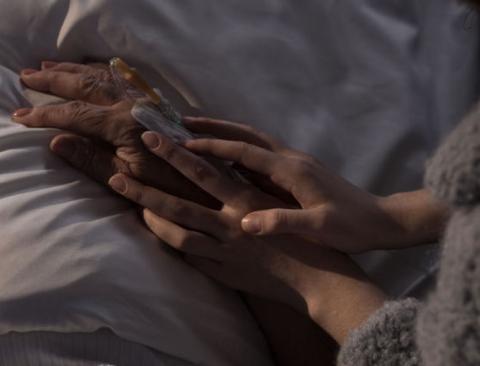When my mom's two-year-long stay at a nursing home was nearing its end, I discovered what hospice care was like. For us (Mom and me) the transition from the nursing home care to hospice care just meant my signing 21 sheets of paper for her to remain in the same bed, in the same room, with a different set of workers driving in every day to change her clothes and give her bath and medications, rather than allowing the caregivers who were already there and had been doing it for two years to continue to do so.
Hospice care began when my mom's kidneys finally failed for the last time. Seldom do nursing home patients drink enough water. A patient who cannot sit up without assistance is not going to raise herself up and reach over to the bedside table to pick up the glass of water that someone sat there a few minutes or hours ago. No matter how many notes I left on the wall reminding the caregivers to be sure my mom drank plenty of water every day, they complied by making sure a full glass of water was placed by her bed--not by raising her up and lifting the glass to her mouth so she could drink it.
Every once in a while I would test the system by leaving a full glass of water, going away for a few hours, then coming back to see that the glass was still full. Then I would complain to the director, who would fuss at the caregivers, who would dutifully make sure she drank water for a few days--then go back to the same old pattern of just making sure a full glass was sitting by the bed
This typical situation causes most nursing home patients who cannot fend for themselves to have numerous bladder and kidney infections, whereupon they are given strong antibiotics and for a few days, caregivers make sure they get plenty of water--then attention slacks off and its back to the status quo.
After two years of this, a particularly strong antibiotic shut my mom's kidneys down permanently. It was time for dialysis, and my 96-year-old mom, who had been unable to walk or even sit up on her own for two years, had told me in no uncertain terms, years ago, that she did not want to be kept alive by undergoing that kind of procedure. Six months before this when I asked her one day what she was thinking about, she said, "Wishing I was dead." I said, "Do you want to leave me?" She said, "Yes, I'm tired."
She hated the lift they had to use to get her from bed to wheelchair. She hated sitting in the dining room for hours. She hated the food. I knew it was my duty not to allow them to force her to undergo dialysis. So I told them, "No, we're not going to do this." So it was time to go into hospice care. This choice, of course, meant that she would last two or three weeks at the most. After two days she closed her eyes and never opened them again, except for one brief moment.
She lasted twelve days, during which time we experienced "hospice." Even though it was known she only had a few more days to live, the perky, cheery hospice worker who brought me the 21 pieces of paper to sign to officially be in hospice, said to me, "I'm going to check and see how you're doing every two weeks or so, okay?" I just said, "okay", and she didn't even notice the sarcasm.
The workers who were her regular caregivers and had come to love her weren't allowed to tend to her. The hospice people had to drive in to do that. But it didn't matter to Mom because even though she was laying there breathing it really seemed as if she was already gone.
I sat by the bed every day, whispering in her ear because they say the hearing is the last to go, until it seemed as if even the whispering was invading her privacy. She was trying to get somewhere else and I was in the way. So then I just sat there, not disturbing her. The chaplain told me to sing "Jesus Loves Me", because that was Mom's favorite song. I did and she opened her eyes briefly, but saw it was just me and not Jesus and closed them again.
At 4:00 am on a Friday morning a strange hospice worker called me to say Mom was gone. I said, "I'm coming, I'm coming." He said, "Take your time." When I arrived at the nursing home no one greeted me at the door. The front hall was empty. I took the elevator to the fourth floor and the strange hospice worker was sitting at the front desk. He told me to take all the time I wanted with her and then he would call the funeral home. I stood by Mom's bed and saw they had put her in a fresh gown and combed her hair. I hugged her tight, because though her forehead and her arms were cold, her big chest was still warm. I got a good last hug.
"I love you, Mama. Tell Daddy I said hi. I'll see you in a minute. I'll see you in the morning. Save a seat for me." The strange hospice worker called the funeral home. They came and got her-- threw a dark blue canvas over her and wheeled her to the elevator and then out the front door. I had to sign something. Then we left.
That was hospice. They sent me a letter every three months for a year asking me how I was doing and giving me a number to call if I needed any help.




